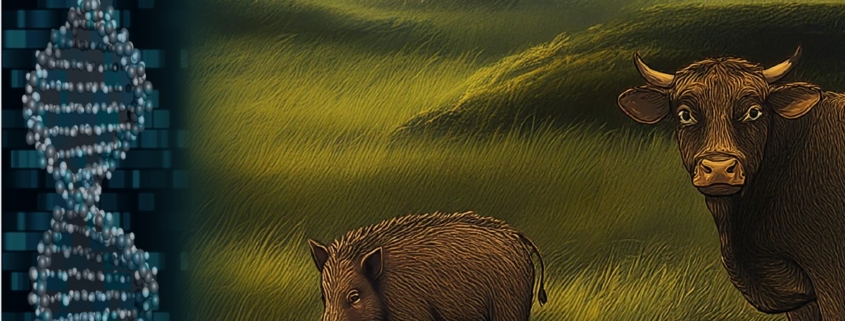Perspectives on Animal Husbandry and Human-Animal Relationships: A Multi-Proxy Approach – 11 December 2024
Date: 11 December 2024
Location: Nijenborgh 6, 9747 AG, Groningen, room 62 (ground floor)
Credits: 1 ECT
Animal husbandry, encompassing both the domestication and management of animals, has profoundly shaped the evolutionary history of both humans and animals for millennia. This workshop will explore the intricate relationships between humans and animals, emphasising the social, economic and ecological factors of these interactions. Using multiproxy methodologies, the workshop combines archaeological, zooarchaeological, paleogenomic, isotopic, and paleoenvironmental data to enhance our understanding of human-animal interactions through time.
We will cover a geographical area encompassing both the Fertile Crescent and Europe, exploring human-animal relationships across diverse landscapes and communities, as well as the economic role of animals. Emphasis will be placed on how integrating multiple lines of evidence can provide insights into the mutual impact on evolution and environments of both humans and animals. This workshop aims to foster interdisciplinary discussion and collaboration among scholars from various fields.
Programme
12:00 – 12:30 Registration
12:30 – 12:45 Welcome and introduction (organizers)
12:45-13:15 Keynote Lecture: Dan Bradley: Ancient genomes of aurochs and cattle and the nature of domestication.
Session 1, chair: Merita Dreshaj
13:15-13:20 Opening session
13:20 – 13:40 Lecture 1: Jolijn Erven: The complex human-animal interactions in Neolithic Central and Northern Europe
13:40 – 14:00 Lecture 2: Kevin Daly: Following The Hoof-prints: Parallels and Peculiarities of Small Ruminant Domestication in Southwest Asia
14:00-14:20 Lecture 3: Hannah Dugdale: The evolution of ageing in wild animal populations
14:20-14:40 Coffee Break 1
14:40-15:00 Lecture 4: Victoria Mullin: Ancient genomics to explore cattle and human interactions on the Western Atlantic Edge
15:00-15:20 Lecture 5: Catarina Ginja: Hybridization as a source of genetic variation: clues from Iron Age cattle from Althiburos, Tunisia
15:20-15:40 Discussion
Session 2, chair: Jolijn Erven
15:40-15:45 Opening session
15:45 – 16:05 Lecture 5: Max Price: Approaching Pig Husbandry Through Multiples Lines of Evidence: Prospects and Perils
16:05 – 16:25 Lecture 6: Donna De Groene: Animal management Pigs in the Neolithic of the eastern Fertile Crescent: New evidence from Pre‐Pottery Neolithic Bestansur and Shimshara, Iraqi Kurdistan (7800–7100 BC)
16:25-16:45 Coffee break 2
16:45 – 17:05 Lecture 7: Rosalind Gillis: Diverse woodland use during the LBk in central Europe
17:05 – 17:25 Lecture 8: Hans Huisman: Shifty baselines: archaeological implications of the variability of C,N isotopes in wetland landscapes
17:25 – 17:55 Discussion & Closing remarks
Credits: ARCHON members can receive 1 ECT for attending the conference and handing in a report of max. 2000 words within one month of the event afterwards, including 140 pages of additional literature. Please send your report to Jolijn van Erven for assessment. Please direct any questions about the assignment to the ARCHON coordinator.
Registration: Closed!

